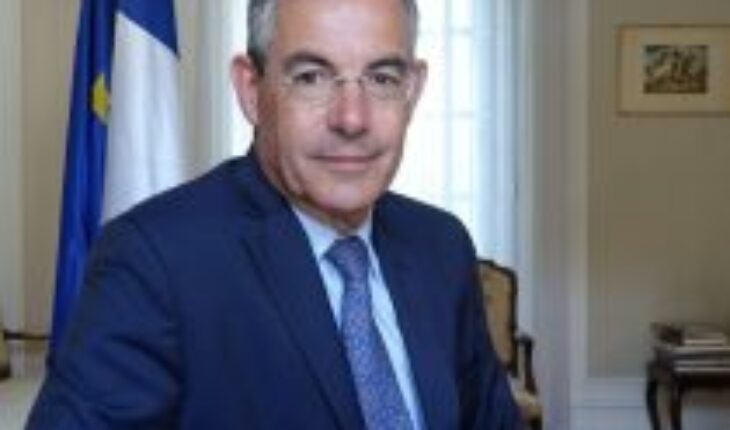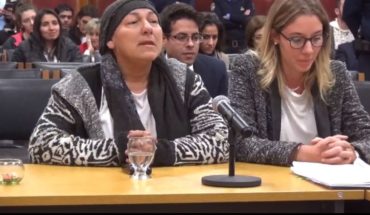The last thing that was known about relations between Chile and France was through a tweet from President Emmanuel Macron, in which he showed his support for the families affected by the fires that are affecting the center-south of the country. After this interaction, Ambassador Pascal Teixeira Da Silva’s first task from his office in Providencia was to coordinate with the Government the needs in the face of the emergency. Finally, French Interior Minister Gérald Darmanin confirmed that 80 firefighters and first responders would be sent to fight the forest fires.
Pascal Teixeira Da Silva delivered his Letters of Credence to the Ministry of Foreign Affairs of Chile in October 2021, since then he has toured Chile attending different events and meetings relevant to relations between both countries, he has also been a relevant actor in Franco-Chilean economic relations, especially related to the energy transition such as green hydrogen and lithium.
“We already have several French companies in the energy sector in Chile and others are already involved in the development of green hydrogen, which is the energy source of the future. All these companies are working in the renewable energy sector, which is the case of Engie and EDF, with solar plants and wind farms, and there are several projects. Chile has several comparative advantages in this regard: wind energy and solar energy that has one of the highest degrees of efficiency in the world and also a low production cost. It is an advantage not only for national local consumption, but also for export, because Chile is far from the large consumption areas that are Europe, Asia, North America, but with a low production cost, “said the French ambassador to El Mostrador.
The development of the green hydrogen industry is increasingly attracting the attention of foreign companies, moreover, on January 20, 2022, the Punta Arenas Declaration was signed, an agreement that links and promotes public-private collaboration between the Chilean Government and institutions within which French companies appear.
Then, on June 6 of that same year, the mission of MEDEF International was kicked off, that is, the trade association of French companies which is led by VP Hydrogen of the Engie group.
In that sense, Pascal Teixeira Da Silva said that in the first instance the development of green hydrogen would be used for domestic consumption, especially in the mining industry. This would be a first step to decarbonize activities and in the future also to melt, for example, in steel production and thus replace coal. “We know that the export of green hydrogen over long distances is a bit complicated and that is why there is the possibility of exporting ammonia and methanol,” he says.
“The big French energy companies are not the only ones that have an interest in Chile. There are several countries and that is an important aspect Chile has another key resource for the energy transition which is copper. Because the developing use of electricity means a need for power grids. Also the renewal of existing networks. For example, the rules have changed and we have to replace many cables in the circuits of the electricity networks in Europe and that needs more copper. And we know that an electric car needs much more copper than a car with a thermal engine and Chile is still the world’s leading producer of copper,” added the ambassador.
In addition, Teixeira Da Silva, said another of the relevant industries for the development of electric motors is lithium. Recall that Chile is the second world producer of lithium after Australia and together with Bolivia and Argentina, the country configures the so-called lithium triangle. The three countries together hold around 85% of the world’s reserves of the metal.
“We know that lithium is a key resource for the production of electric motors and Chile is also number one or two in this respect. And here, in my opinion, there are two important aspects that are key for the Government, first is that lithium extraction needs more innovative technologies that respect the environment and save water. And we have three French companies that have developed innovative technologies which are Eramet, Geolith and Adionics. The first is a French mining company that is already operating a lithium extraction plant in Argentina and is interested in developing its techno.logy in Chile within the framework of the National Lithium Strategy that we hope will come out, “he said.
“In the second aspect is to talk about the valorization of the lithium resource in Chile because the export of lithium carbonate or lithium hydroxide is useful but does not mean the creation of added value in Chile and here we are working with a technical solution developed by a French company -Bolloré- that uses lithium metal for the production of batteries for buses, it is something that already exists in France and that could be a way to use the lithium resource here in Chile for bus propulsion,” added the ambassador.
Another important aspect mentioned by Pascal Teixeira Da Silva is the importance of generating dialogue between public and private actors and communities.
“We know that social and environmental responsibility towards local and environmental communities is an essential point for the future of economic activities,” he said.
He also pointed out that from the business world “there are environmental standards and assessments” that must be complied with.
“It is important that the dialogue takes place in an atmosphere of trust, there are things that can be improved in terms of procedures, processing and deadlines but I know through my contacts with ministers that there is an awareness of the need to improve them,” he said.
War between Russia and Ukraine
This February 24 marks one year since the beginning of the war between Russia and Ukraine, in this regard the ambassador maintains that it is a “true break in the history of Europe since the end of World War II.”
“Russia made a tremendous strategic mistake. The initial idea was to go to Kiev and overthrow the government and thinking that the Russian armed forces would be welcomed as brothers and liberators was a mistake, which was not the case. And that invasion aroused a patriotic feeling on the part of the Ukrainians and also a capacity for resistance on the part of the Ukrainian armed forces. There was an underestimation by Russia, of Ukrainian patriotic sentiment and also of the defense capabilities, not only of the Armed Forces, but also of the people,” he said.
“The problem is that when Russia started this war, I had not thought that in a year later the war would have been prolonged and with the prospect of going on even more months,” he added.
Pascal Teixeira Da Silva assesses that today the conflict is no longer “only about war, but also about the future of the democratic regime. Russia has started a process that has not developed as planned and the options can be very dangerous from the point of view of the future of the regime.”
In that sense, he declared that President Macron along with other international actors have “tried to maintain communication with Putin” to see the possibility of initiating a diplomatic end to the war.
“The problem is that so far none of these actors has managed to start this process, because when there is a military conflict it is thought that the military situation should be more favorable to be able to start a peace negotiation,” he explained.
“But we are committed to maintaining our help. And I’m not just talking about France, but also all European countries and other North American countries when necessary,” he added.
In addition, he said Putin did not think the European Union would be able to maintain its unity. “There were discussions and divergences at times but he has maintained his unity,” he said.
In relation to Europe’s renunciation of Russian gas distribution, Teixeira Da Silva mentioned that “a positive consequence” was that it took the step to the “decarbonization of the energy matrix.”
It should be remembered that Russia supplied 40% of the gas to Europe, although the percentage was not the same for all countries, for example, Germany received 60% and France 17%.
“The renunciation of Russian gas also needs an acceleration of the energy transition. In the short term we had to compensate Russian gas by buying abroad and with other suppliers from other regions but I think it was also an alarm. […] It’s not just fighting climate change, but it also has geopolitical risks, especially when you’re very dependent on a supplier, a supplier that has an important place,” he said.
“The diversification of suppliers is a rule and not only for gas, but also for many other raw materials. And also the nature of the political regime of the supplier is something important, in this regard, Chile has more of a comparative advantage being a country with many resources necessary for the energy transition and for being a democracy with a rule of law. Having a supplier that is an authoritarian regime that can be very dangerous or unreliable,” he added.
Cultural relations between France and Chile
Ademore than economic cooperation the French embassy in Chile has a work with culture that has been present for years. This 2023 commemorates 50 years of the coup d’état. During the dictatorship the French embassy and residence received around 1,700 exiles, including relevant figures for culture in Chile and the world such as Raúl Ruiz.
The ambassador affirmed that they are already working on artistic and debate projects for the commemoration of September 11.
“We have already started working and there are several artistic or debate projects to participate in the commemoration of the events of 73 and especially the role that France and other European countries have played to protect those who tried to escape persecution and then to welcome refugees who went to France,” Said.
In addition, he said that they are “in contact with all the coordinators at the national level such as Patricio Fernández, to contribute our contribution to the commemoration,” he added.
In this regard, he said that “it is important that there is a more contemporary view” of the events of history. In that sense, he stressed that democracy and international solidarity are key issues. “There are many countries where there is no democracy,” he said.
“Democracy is an ideal and it is something that must be defended and promoted, it is a combat that is still very relevant and this is an issue that has a very current resonance,” concluded the ambassador.
Follow us on





